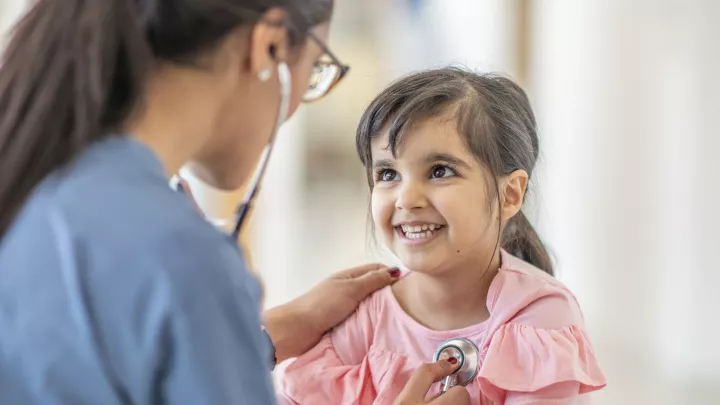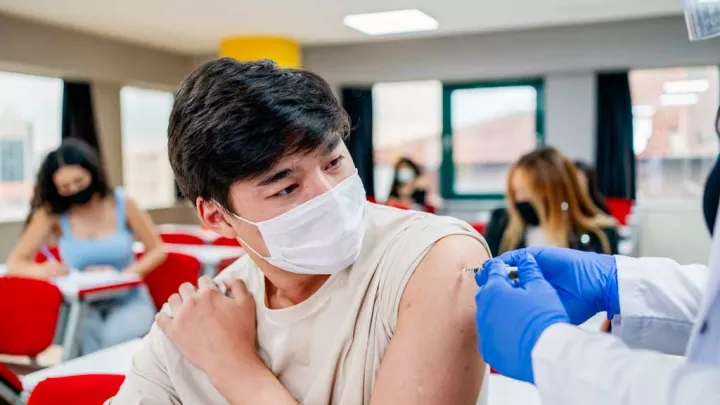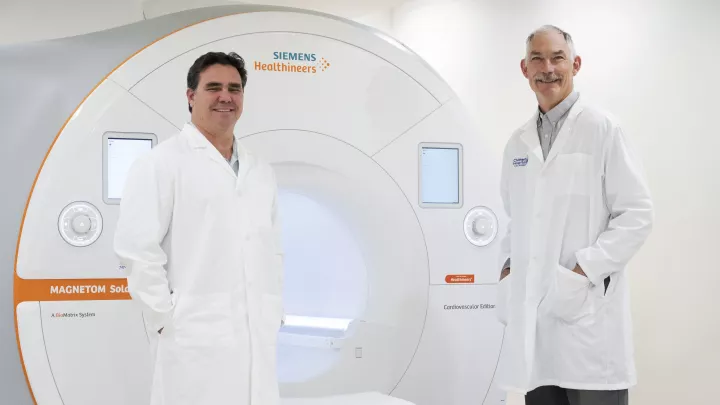Pediatric Heart Programs and Services
No matter what heart problem your child has, we have an expert who can treat the condition. At our Heart Institute, your child gets leading-edge treatment in a child-friendly environment.
Find a Program or Service
We offer care for heart conditions in a convenient, centralized location. Learn more about the heart programs we offer:
- Adult Congenital Heart Disease Program
- Biventricular Repair or Conversion Program
- Cardiac Anesthesiology
- Cardiac Critical Care Medicine
- Cardiac Psychology Program
- Cardiogenomics Program
- Cardiology
- Cardiomyopathy and Heart Failure Program
- Cardiothoracic Intensive Care Unit (CTICU)
- Cardiothoracic Surgery
- Cardiovascular Acute Unit
- Complex Congenital Heart Disease Program
- Coronary Anomaly Program
- Electrophysiology Program
- Extracorporeal Membrane Oxygenation (ECMO) Program
- Fetal Cardiology Program
- Fontan Program
- Heart Transplant Program
- Heart Valve Program
- Interventional Catheterization Program
- Kawasaki Disease Program
- Preventive Care Program
- Pulmonary Hypertension
- Single Ventricle Program
- Thoracic and Chest Wall Deformities Program
- Vascular Ring Program
- Ventricular Assist Device (VAD) Program
Adult Congenital Heart Disease Program
Our program helps teens transition from pediatric to adult heart care. We help teens learn to manage their health and connect them with an adult cardiologist. If surgery becomes necessary, we have an entire team Board-certified in adult and pediatric heart surgery devoted to making them well again.
Biventricular Repair or Conversion Program
This program gives children two working ventricles. Surgeries we perform include biventricular repair, biventricular conversion and staged recruitment. These procedures provide better long-term outcomes for children with single ventricle defects. Our surgeons have the expertise necessary to perform these complex procedures.
Cardiac Anesthesiology
This expert team has special training in pediatric cardiac anesthesia. They have experience managing anesthesia for children with all types of heart conditions. They know how to keep your child safe and comfortable during procedures that require sedation. Learn more about cardiac anesthesiology.
Cardiac Critical Care Medicine
Children who have surgery recover in our Cardiothoracic Intensive Care Unit (CTICU). This ICU is also where children with the most severe heart conditions receive care. Ventricular assist devices support heart function in critically ill children. Discover more about cardiac critical care medicine.
Cardiac Psychology Program
Our Cardiac Psychology Program provides mental health care for children with heart conditions. We offer evaluation, treatment and coping skills. Learn how our Cardiac Psychology Program can support your child.
Cardiogenomics Program
Our genetics experts can help diagnose congenital heart conditions and guide your family in planning for the future. The Cardiogenomics team collaborates with the Cardiology care team to help you better understand diagnosis and treatment options. Learn more about cardiogenomics for genetic heart conditions.
Cardiology
Children’s Hospital cardiology programs treat heart conditions that may not require surgery. We offer advanced treatments to give your child the best quality of life. Find out more about pediatric cardiology.
Cardiomyopathy and Heart Failure Program
Our doctors are leaders in heart failure research, giving your child access to new treatments and clinical trials. We also offer advanced genetic diagnosis, including whole-exome sequencing for genetic cardiomyopathies. Learn more about our Cardiomyopathy and Heart Failure Program.
Cardiothoracic Intensive Care Unit (CTICU)
Our CTICU team specializes in pediatric cardiac intensive care and treating rare heart conditions. CTICU staff members have expertise in advanced technologies including mechanical support devices. Learn more about our pediatric Cardiothoracic Intensive Care Unit.
Cardiothoracic Surgery
We’re known for outstanding outcomes in many procedures, including:
- Biventricular conversion
- Norwood procedure
- Ross procedure
- Starnes palliation of neonatal Ebstein anomaly
- Ozaki aortic valve replacement
- Mitral valve repair
We also use advanced technology, such as MRIs and 3D imaging. These tests help increase accuracy and improve outcomes for complicated heart surgeries. For the most complex cases, we can 3D print a model of your child’s heart. This model allows surgeons to practice the procedure using your child’s unique heart muscle structure. Read more about cardiothoracic surgery.
Cardiovascular Acute Unit
Our Cardiovascular Acute Unit cares for children with heart conditions and after heart surgery where our specialized team helps children recover safely. Learn more about our Cardiovascular Acute Unit.
Complex Congenital Heart Disease Program
Complex congenital heart disease refers to a group of structural heart defects present at birth. Our renowned surgeons have expertise treating all types of congenital heart defects, from common and mild to rare and severe. Learn more about the Complex Congenital Heart Disease Program.
Coronary Anomaly Program
This offering specializes in surgery to correct coronary arteries that form in the wrong place. Learn more about Coronary Anomaly treatment.
Electrophysiology Program
Our dedicated heart rhythm specialists treat electrical problems in the heart. Heart rhythm problems may arise in the hours and days following surgery. If that happens, your child receives expert care from this specialized team. If the heart rhythm disorder is genetic, our experts work closely with the cardiogenomics team to provide genetic testing. See how our electrophysiology team can help your child.
Extracorporeal Membrane Oxygenation (ECMO) Program
Children’s Hospital has the largest and one of the first pediatric ECMO programs in California. Our experienced ECMO team provides world-class, lifesaving care. Learn more about the ECMO program.
Fetal Cardiology Program
Our hospital is the hub for fetal maternal care. We are here to help you from diagnosis through pregnancy to birth and beyond. Our sonographers are board-certified in fetal echocardiography. This certification means they specialize in using high-resolution scans to diagnose heart defects before birth. Our fetal-maternal cardiology nurse care manager can guide you through treatment options, pregnancy care and considerations for delivery. Discover how the Fetal Cardiology Program can support you.
Fontan Program
The Fontan procedure is the third surgery to repair a single ventricle defect. Sometimes, children need more surgery after the Fontan. Our Fontan Program helps identify the least invasive and most beneficial treatment options for your child.
Heart Transplant Program
Vaughn Starnes, MD, co-director of the Heart Institute, is a globally recognized pioneer in pediatric heart transplants. Success is measured for these programs by one- and three-year survival rates, and ours are among the best in the U.S. Learn more about our Heart Transplant Program.
Heart Valve Program
Whenever possible, we repair heart valves instead of replacing them. This approach gives your child a better quality of life and reduces the risk of future surgeries. Our surgeons are nationally recognized experts in mitral valve repairs and aortic valve replacements. Explore the repair and replacement options our Heart Valve Program offers.
Interventional Catheterization Program
Our program is home to the largest pediatric catheterization facility by volume in the Western United States. Our patients have great outcomes because we have so much experience with these procedures. And thanks to our exceptional safety scores, children in our care rarely experience complications. Learn more about our Interventional Catheterization Program.
Kawasaki Disease Program
Kawasaki disease, sometimes referred to as Kawasaki syndrome, is an inflammatory disease that usually affects children under age 5. It is the most common cause of acquired heart disease in children in the U.S. Children's Hospital Los Angeles was one of the first hospitals in the U.S. to begin researching and treating Kawasaki. Our depth of experience enables us to give your child world-class care.
One of our current research projects explores the genetics of COVID-19 and related conditions, including multisystem inflammatory syndrome in children (MIS-C). MIS-C has similar symptoms to Kawasaki. Learn about our Kawasaki Disease Program.
Preventive Care Program
High cholesterol or triglycerides (hyperlipidemia) can increase the risk of developing other heart conditions. Our team diagnoses and treats this condition early, reducing the risk of future complications. Find out more about the preventive care for high cholesterol in children.
Pulmonary Hypertension
Pulmonary hypertension is high blood pressure in the lungs. We have doctors who specialize in treating this complex condition. Your child gets the latest and most advanced pulmonary hypertension treatments at Children's Hospital Los Angeles. Learn more about our pediatric pulmonary hypertension services.
Single Ventricle Program
Children born with single ventricle defects need a series of surgeries. This program monitors children with these complex defects throughout the process, leading to better outcomes. Find out more about the Single Ventricle Program.
Thoracic and Chest Wall Deformities Program
Whether your child's chest sticks out, caves in or needs reconstruction, we can help. Chest wall anomalies range in severity and may become more noticeable during puberty. These defects can affect your child's physical or mental health. Our multidisciplinary team specializes in minimally invasive treatments for chest wall anomalies.
Vascular Ring Program
When the aorta doesn’t form properly, it can create a ring around the windpipe and esophagus. The Vascular Ring Program specializes in repairing these defects.
Ventricular Assist Device (VAD) Program
Ventricular assist devices mechanically support a child’s heart when it is failing. If a patient’s condition suddenly worsens, it’s important to be at a facility like Children's Hospital Los Angeles because we have child-sized VADs.
A VAD can give your child’s heart a temporary break to recover from sudden illness. It can also support your child’s heart while waiting for a heart transplant. Explore the options our Ventricular Assist Device Program offers.


